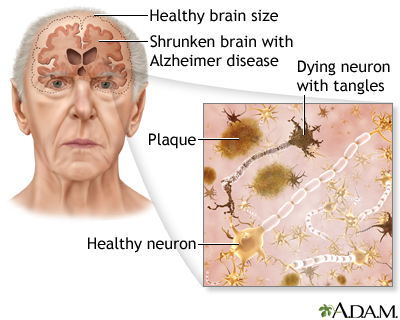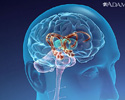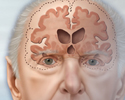Alzheimer disease
Senile dementia - Alzheimer type (SDAT); SDAT; Dementia - Alzheimer
Dementia is a loss of brain function that occurs with certain diseases. Alzheimer disease is one form of dementia. It affects memory, thinking, and behavior.
Causes
The exact cause of Alzheimer disease (AD) is not known. Research shows that certain changes in the brain lead to AD.
You are more likely to develop AD if you:
- Are older. Developing AD is not a part of normal aging.
- Have a close relative, such as a brother, sister, or parent with AD.
- Have certain genes linked to AD.
The following may also increase the risk:
- Being female
- Having heart and blood vessel problems due to high cholesterol
- History of head trauma
There are two types of AD:
- Early onset AD. Symptoms appear before age 60. This type is much less common than late onset. It tends to get worse quickly. Early onset disease can run in families. Several genes have been identified.
- Late onset AD. This is the most common type. It occurs in people age 60 and older. It may run in some families, but the role of genes is less clear.
Symptoms
AD symptoms include difficulty with many areas of mental function, including:
- Emotional behavior or personality
- Language
- Memory
- Perception
- Thinking and judgment (cognitive skills)
AD usually first appears as forgetfulness.
Mild cognitive impairment (MCI) is the stage between normal forgetfulness due to aging, and the development of AD. People with MCI have mild problems with thinking and memory that do not interfere with daily activities. They are often aware of the forgetfulness. Not everyone with MCI develops AD.
Symptoms of MCI include:
- Difficulty performing more than one task at a time
- Difficulty solving problems
- Forgetting recent events or conversations
- Taking longer to perform more difficult activities
Early symptoms of AD can include:
- Difficulty performing tasks that take some thought, but used to come easily, such as balancing a checkbook, playing complex games (bridge), and learning new information or routines
- Getting lost on familiar routes
- Language problems, such as trouble remembering the names of familiar objects
- Losing interest in things previously enjoyed and being in a flat mood
- Misplacing items
- Personality changes and loss of social skills
As AD becomes worse, symptoms are more obvious and interfere with the ability to take care of oneself. Symptoms may include:
- Change in sleep patterns, often waking up at night
- Delusions, depression, and agitation
- Difficulty doing basic tasks, such as preparing meals, choosing proper clothing, and driving
- Difficulty reading or writing
- Forgetting details about current events
- Forgetting events in one's life history and losing self-awareness
-
Hallucinations
, arguments, striking out, and violent behavior
Hallucinations
Hallucinations involve sensing things such as visions, sounds, or smells that seem real but are not. These things are created by the mind.
Read Article Now Book Mark Article - Poor judgment and loss of ability to recognize danger
- Using the wrong word, mispronouncing words, or speaking in confusing sentences
- Withdrawing from social contact
People with severe AD can no longer:
- Recognize family members
- Perform basic activities of daily living, such as eating, dressing, and bathing
- Understand language
Other symptoms that may occur with AD:
-
Problems controlling bowel movements or urine
Problems controlling bowel movements or...
Urinary (or bladder) incontinence happens when you are not able to keep urine from leaking out of your urethra. The urethra is the tube that carries...
 ImageRead Article Now Book Mark Article
ImageRead Article Now Book Mark Article - Swallowing problems
Exams and Tests
A skilled health care provider can often diagnose AD with the following steps:
- Performing a complete physical exam, including a nervous system exam
- Asking about the person's medical history and symptoms
- Mental function tests (mental status examination)
A diagnosis of AD is made when certain symptoms are present, and by making sure other causes of dementia are not present.
Dementia
Dementia is a loss of brain function that occurs with certain diseases. It affects memory, thinking, language, judgment, and behavior.

Tests may be done to rule out other possible causes of dementia, including:
-
Anemia
Anemia
Anemia is a condition in which the body does not have enough healthy red blood cells. Red blood cells provide oxygen to body tissues. Different type...
 ImageRead Article Now Book Mark Article
ImageRead Article Now Book Mark Article -
Brain tumor
Brain tumor
A primary brain tumor is a group (mass) of abnormal cells that start in the brain.
 ImageRead Article Now Book Mark Article
ImageRead Article Now Book Mark Article - Chronic infection
- Intoxication from medicines
- Severe depression
-
Increased fluid on the brain (
normal pressure hydrocephalus
)
Normal pressure hydrocephalus
Hydrocephalus is a buildup of spinal fluid inside the fluid chambers of the brain. Hydrocephalus means "water on the brain. "Normal pressure hydroce...
 ImageRead Article Now Book Mark Article
ImageRead Article Now Book Mark Article -
Stroke
Stroke
A stroke occurs when blood flow to a part of the brain stops. A stroke is sometimes called a "brain attack. " If blood flow is cut off for longer th...
 ImageRead Article Now Book Mark Article
ImageRead Article Now Book Mark Article - Thyroid disease
- Vitamin deficiency
CT or MRI of the brain may be done to look for other causes of dementia, such as a brain tumor or stroke. Sometimes, a PET scan can be used to rule out AD.
CT
A head computed tomography (CT) scan uses many x-rays to create pictures of the head, including the skull, brain, eye sockets, and sinuses.

MRI
A head MRI (magnetic resonance imaging) is an imaging test that uses powerful magnets and radio waves to create pictures of the brain and surrounding...

PET scan
A brain positron emission tomography (PET) scan is an imaging test of the brain. It uses a radioactive substance called a tracer to look for disease...
The only way to know for certain that someone has AD is to examine a sample of their brain tissue after death.
Treatment
There is no cure for AD. The goals of treatment are:
- Slow the progression of the disease (although this is difficult to do)
- Manage symptoms, such as behavior problems, confusion, and sleep problems
- Change the home environment to make daily activities easier
- Support family members and other caregivers
Medicines are used to:
- Slow the rate at which symptoms worsen, though the benefit from using these drugs may be small
- Control problems with behavior, such as loss of judgment or confusion
Before using these medicines, ask the provider:
- What are the side effects? Is the medicine worth the risk?
- When is the best time, if any, to use these medicines?
- Do medicines for other health problems need to be changed or stopped?
Someone with AD will need support in the home as the disease gets worse. Family members or other caregivers can help by helping the person cope with memory loss and behavior and sleep problems . It is important to make sure the home of a person who has AD is safe for them .
Support in the home
Dementia is a loss of brain function that occurs with certain diseases. It affects memory, thinking, and behavior.
Support Groups
Having AD or caring for a person with the condition may be a challenge. You can ease the stress of illness by seeking support through AD resources . Sharing with others who have common experiences and problems can help you not feel alone.
AD resources
The following organizations are good resources for information on Alzheimer disease:Alzheimer's Association -- www. alz. orgAlzheimer's Disease Educa...

Outlook (Prognosis)
How quickly AD gets worse is different for each person. If AD develops quickly, it is more likely to worsen quickly.
People with AD often die earlier than normal, although a person may live anywhere from 3 to 20 years after diagnosis.
Families will likely need to plan for their loved one's future care.
Future care.
Dementia is a loss of brain function that occurs with certain diseases. It affects memory, thinking, and behavior.
The final phase of the disease may last from a few months to several years. During that time, the person becomes totally disabled. Death usually occurs from an infection or organ failure.
When to Contact a Medical Professional
Call the provider if:
- AD symptoms develop or a person has a sudden change in mental status
- The condition of a person with AD gets worse
- You are unable to care for a person with AD at home
Prevention
Although there is no proven way to prevent AD, there are some measures that may help prevent or slow the onset of AD:
- Stay on a low-fat diet and eat foods high in omega-3 fatty acids.
- Get plenty of exercise.
- Stay mentally and socially active.
- Wear a helmet during risky activities to prevent brain injury.
References
Alzheimer's Association. 2015 Alzheimer's Disease Facts and Figures. Washington, DC: Alzheimer's Association. www.alz.org/facts/downloads/facts_figures_2015.pdf . Accessed September 15, 2015.
Galvin JE, Sadowsky CH; NINCDS-ADRDA. Practical guidelines for the recognition and diagnosis of dementia. J Am Board Fam Med . 2012;25(3):367-382. PMID: 22570400 www.ncbi.nlm.nih.gov/pubmed/22570400 .
Knopman DS. Alzheimer disease and other dementias. In: Goldman L, Schafer AI, eds. Goldman's Cecil Medicine . 25th ed. Philadelphia, PA: Elsevier Saunders; 2016:chap 402.
Mitchell SL. CLINICAL PRACTICE. Advanced dementia. N Engl J Med . 2015;372(26):2533-2540. PMID: 26107053 www.ncbi.nlm.nih.gov/pubmed/26107053 .
Peterson R, Graff-Radford J. Alzheimer disease and other dementias. In: Daroff RB, Jankovic J, Mazziotta JC, Pomeroy SL, eds. Bradley's Neurology in Clinical Practice . Philadelphia, PA: Elsevier; 2016:chap 95.
-
Alzheimer disease
Animation
-
Alzheimer disease
Animation
-
Alzheimer disease - illustration
Aged nervous tissue is less able to rapidly communicate with other neural tissues.
Alzheimer disease
illustration
-
Alzheimer disease
(In-Depth)
-
Alzheimer disease
(Alt. Medicine)
Review Date: 8/13/2015
Reviewed By: Joseph V. Campellone, MD, Division of Neurology, Cooper University Hospital, Camden, NJ. Review provided by VeriMed Healthcare Network. Internal review and update on 09/01/2016 by David Zieve, MD, MHA, Isla Ogilvie, PhD, and the A.D.A.M. Editorial team.





